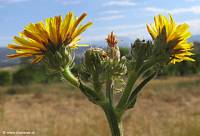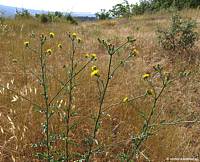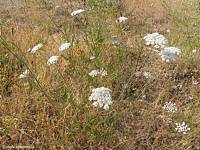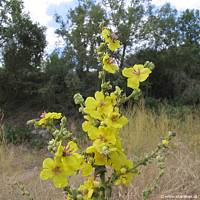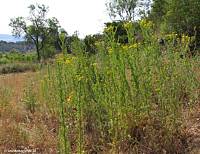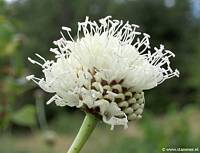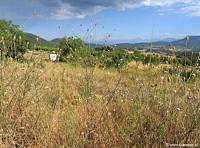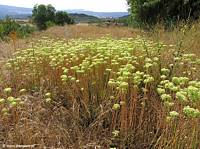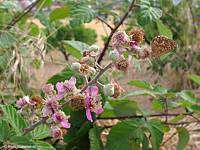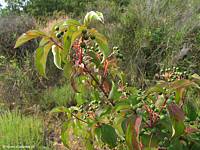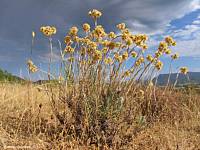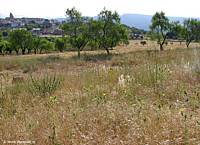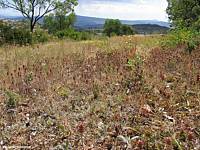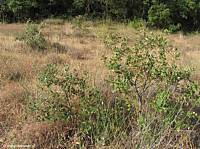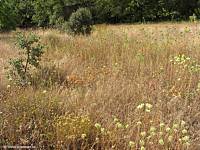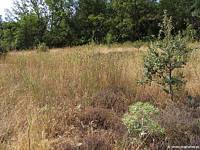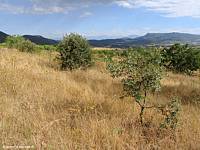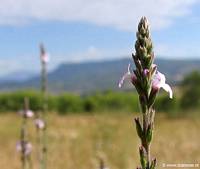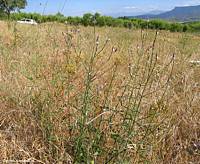|
|
Nature
Switched On
|
|
|
introduction |
2007 July 7 & 8, Saturday & Sunday A new wave a flowering plants was this weekend represented by Picris hieracioides (Hawkweed Oxtongue), Daucus carota (Wild Carrot), Verbascum sinuatum (Wavyleaf mullein) and Tansy Ragwort (Senecio jacobaea) which are growing on many parts of the terrain in considerable numbers.
|
|
|
Close-up of Hawkweed Oxtongue. |
Hawkweed Oxtongue with their
typical branching at the upper-half of the stem. Central terrace, looking south-east. Sunday 9:40 |
|
|
Wavyleaf mullein on the upper terrace, with some
omnipresent ants. |
Wild Carrot. The stem and leaves
are much more slender than the specimen I saw on
22 October 2006. Sunday 9:31 |
|
|
Tansy Ragwort on the oriental
terrace, looking south-east. Sunday 9:57 |
||
|
Less striking is the first
flowering of Cephalaria leucantha (=Scabiosa
leucantha) which reaches even higher than its close cousin
Scabiosa columbaria (Pincushion Flower). The latter has
now finally passed its mayor flowering period. A striking plant that
attrackts loads of insects which don't seem to have any problems
with the terrible swaying in the wind.
|
||
| Close-up
of Cephalaria leucantha. The individual flowers start
blooming very irregularly. Saturday 10:19 |
||
|
Pincushion Flower on the central terrace, looking north-west. Saturday 9:50 |
||
|
The first
flowers of Sedum sediforme (Pale Stonecrop) had
already More or less the same holds true for the brambles, which in all their anarchy and aggressiveness can be quite graceful. Their ecological value is unquestioned and they attract many insects, especially butterflies. |
||
|
Pale Stonecrop on the highest
terrace, looking south-east. Sunday 10:09 |
||
|
Bramble flowers with a butterfly
(Aricia agestis). Saturday 10:49 |
||
|
Many flowers have of course been transformed into fruits these days. The berries of Cornus sanguinea (Dogwood) are still green but the flower stems are of a beautiful red and also some of the leaves start turning red. Helichrysum stoechas is now making clear that he belongs to the Strawflower genus. |
||
|
Dogwood on the central terrace. Sunday 10:15 |
Helichrysum stoechas
on the higher central terrace, looking north-east. Saturday 9:51 |
|
|
|
||
|
Lowest western terrace. Looking
east. Yellow flowers of
Carthamus lanatus. Sunday 9:20 |
||
|
Brown 'beehives' of Prunella laciniata .
Highest terrace, looking south-east. Saturday 10:57 |
||
|
The many small Kermes Oak shrubs (Quercus coccifera) on the higher central terrace are doing very well. Apparently they have also enjoyed the abundant spring rainfall after several dry years and perhaps also the pruning last February had beneficial effects. They form a nice element in a small scale landscape, offering some contrast and relief with their green colour and height.
|
||
|
Kermes Oak shrubs on the higher
central terrace. Saturday & Sunday morning. |
||
|
If you are a poet or writer you should definitively have this herb
in your garden because it has the reputation of stimula
|
||
|
Close-up of a Common Vervain flower. Looking north. Saturday 9:37 |
||
|
Common Vervain near the
entrance. Looking north-west. Saturday 9:39 |
||
|
introduction
|
|
